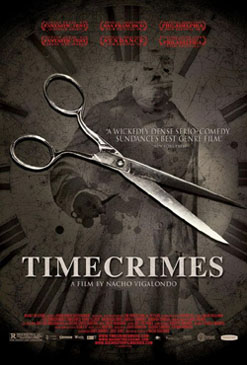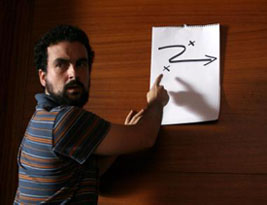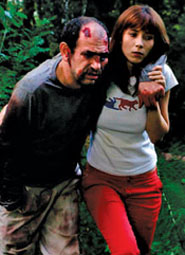Setting out to make an original time-travel story is a bold move to make, especially when you’re a first-time feature director with a limited budget. Not only do you have to come up with something plausible and smart, but with a lack of cash you have to rely on compelling characters and storytelling rather than flashy effects. And it better sure make sense, as without CGI lulling them into a hypnotized state,  the audiences focus is going to be squarely on the conceivability behind the science. Even with all of these hurdles, Nacho Vigalondo has managed to clear them all and create a wonderfully fascinating thriller with Timecrimes.
the audiences focus is going to be squarely on the conceivability behind the science. Even with all of these hurdles, Nacho Vigalondo has managed to clear them all and create a wonderfully fascinating thriller with Timecrimes.
Héctor, a middle-aged man who has recently moved to a new house with his wife, is a bit of a voyeur. He enjoys relaxing in his sprawling backyard and looking into the forest around the area with his binoculars. One evening, in addition to noticing an odd radio tower in the area for the first time, he spies a beautiful young woman in the woods, nude and apparently in distress. Not about to let this go uninvestigated, Héctor sets off into the woods to see what the problem is. Once in the woods, he finds the girl unconscious, slumped up against rock. As he bends down to find out if she’s okay, he’s stabbed in the arm by an unknown assailant. Héctor runs off in shock, but manages to catch a glimpse of a man whose face is covered in bandages and wearing a trenchcoat, who also holds a pair of bloody scissors in his hand.
Afraid for his life, Héctor fumbles through the woods and stumbles upon an isolated building. Panicked, he breaks a window to get inside, and makes contact with a man via a walkie-talkie found in the house. The man on the other end tells Héctor he works there as a scientist, and once told of the situation, guides him to his lab. The only way he can think of to hide Héctor from the bandaged lunatic is to put him inside of a giant device filled with water and close it. Héctor looks perplexed, but it’s his only choice, so he does so. When the container reopens, Héctor is surprised to see it’s no longer dark outside, thinking he’d spent the entire night in the device. The lab technician tells him that’s not the case…he’s actually traveled back in time. Héctor refuses to believe such nonsense; that is until he uses his binoculars and sees his wife and himself lounging around in his backyard…
Timecrimes reminded me a lot of Shane Carruth’s Primer (one of my favorite time-travel films of the past decade), in that the schematics of the time-travel elements will have all but the most brilliant of brains crying in defeat. But just like in Primer, if you don’t fully comprehend the components behind the time-travel principles, Timecrimes has an  uncanny ability of keeping your attention regardless, due to the trials and tribulations of the main character. While at its root this is a time-travel film, it focuses squarely on the terrible predicament Héctor has found himself in more-so than the technical aspects, and a man in trouble is a plot device that is easy to identify with (even if the trouble the man is in is almost completely created by his actions).
uncanny ability of keeping your attention regardless, due to the trials and tribulations of the main character. While at its root this is a time-travel film, it focuses squarely on the terrible predicament Héctor has found himself in more-so than the technical aspects, and a man in trouble is a plot device that is easy to identify with (even if the trouble the man is in is almost completely created by his actions).
While it probably won’t come as a surprise who the bandaged man turns out to be, where the plot ultimately goes is unexpected, and the film is so intricately plotted that everything falls into place quite nicely. You’ll surely experience a few “ah-hah!” moments as you make your way down the film’s twisting narrative structure. Even if your brain shuts down at the thought of the time-traveling itself (and trust me, it probably will), it’s easy to follow Héctor's increasingly hectic situation, one that anyone that’s read Ray Bradbury’s A Sound of Thunder or seen Alfred Hitchcock’s Rear Window will know well.
Another unique facet of the film is that the time machine itself, while it sends you back in time, seems to also have a nasty habit of creating doppelgangers. Now I understand that if someone were to go back in time to a period in which they were living, they could be faced with seeing their past self. But by the end of Timecrimes, there’s at least three Héctor’s running around, and as out of hand as things get by the film's finale, there could have been more for all we know. I won’t pretend to be an expert on time-travel films, so there may very well be another film like this buried out there somewhere, but it’s not something I’ve personally seen. It could be argued that there are multiple timelines converging, which would account for the multiple Héctor’s, but…ah forget it, my brain is melting again.
Like all foreign films that don’t suck (and even some that do!), a US remake is already in the works for Timecrimes, but you owe it to yourself to see this first if you haven’t already. It’s an engrossing foray into man attempting to right a wrong with a sci-fi twist, one that’s so expertly crafted that anyone with an appreciation for smart script writing should appreciate.

Released as part of Magnet’s Six Shooter Film Series, Magnolia Pictures' DVD of Timecrimes is a bit of a disappointment. Not because it isn’t loaded with extra content, but because the transfer of the film itself is sadly lacking. Presented in 1.85:1 anamorphic widescreen, the transfer looks almost like it was taken from an inferior print. I saw the film originally in a theatre, and it did not look this washed-out or muddy. Textures look like mush on the disc, and there are a ton of artifacts and color smear. In fact, it almost looks like a crappy DivX encode that doesn’t have a good enough bitrate (and this doesn’t). Add to that it isn’t progressive scan, and it’s overall a real letdown. Considering the extras clock in at nearly the same amount of time as the film itself, maybe this was a prime candidate for a 2-disc release. Audio is available in Dolby Digital 5.1 and 2.0 flavors for both the original Spanish language as well as the English dub. I viewed the film in its original language and in 5.1. The mix isn’t nearly as good as I had hoped for, but all of the dialogue is at least clear, and there are a few moments of nice directionality.
A wealth of extras kicks off with a 45 minute making of featurette, which is an interesting behind-the-scenes look at how everything came together. There aren’t many interviews during it, so it’s really a true-to-form look at what went on behind the camera. Next up are some cast and crew interviews, where you basically get the making of the film from the perspective of those involved. The most unique extra comes way of the “Timecrimes Internet Game”; much like the viral campaigns behind the television show Lost, the filmmakers of Timecrimes launched an internet game to get people interested about the release of the film. While you won’t actually be playing the game itself, you will get to see a lot of portions of it and reactions from fans that played it. Showing off some nice synergy between the two productions, it actually expands on the film’s story in a couple of areas. Also included here is director Nacho Vigalondo’s debut short film entitled 7:35 in the Morning, which is a bizarre little piece of cinema that’s very much an opposite of Timecrimes. The disc is rounded out with a short piece on the make-up used in the movie, a short photo gallery, and a trailer for this and other films in the Six Shooter Film Series.
Please feel free to discuss "Timecrimes" here, in our forums!

